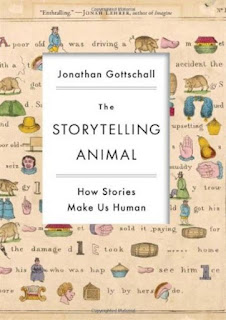This term is shaping up to be a sea adventure!
lots of resources . . . .
who you calling
“The universe is made of stories, not atoms,” poet Muriel Rukeyser memorably asserted, and Harvard sociobiologist E. O. Wilson recently pointed to the similarity between innovators in art and science, both of whom he called “dreamers and storytellers.” Stories aren’t merely essential to how we understand the world — they are how we understand the world. We weave and seek stories everywhere, fromdata visualization to children’s illustration tocultural hegemony. In The Storytelling Animal, educator and science writer Jonathan Gottschall traces the roots, both evolutionary and sociocultural, of the transfixing grip storytelling has on our hearts and minds, individually and collectively. What emerges is a kind of “unified theory of storytelling,” revealing not only our gift for manufacturing truthiness in the narratives we tell ourselves and others, but also the remarkable capacity of stories — the right kinds of them — to change our shared experience for the better.~ Maria Popova

















Poe himself later called it "a very silly book". Nevertheless, The Narrative of Arthur Gordon Pym of Nantucket became an influential work, notably for Herman Melville and Jules Verne.
ReplyDeleteThe answer is simple when you're standing by the Clearwater River in front of the imploded Heart of an ancient Monster.
ReplyDeleteThe Giants aren't suicidal at all: merely monstrous. What is killing us is what feeds them. Monster-think is spiritually bankrupt, but voraciously logical. For Big Oil and Energy, producing salable products for entrapped consumers––products that lead to ocean dead zones, species extinction, dying forests, dying citizens, lost democracies, climate refugees, biocide, deicide--is still profitable at the moment. The threat of climate chaos means nothing to a feeding Monster.
~David James Duncan:
The Heart of The Monster
climate chaos
ReplyDeletea monkey dance or stumbling . . .
ReplyDeleteReading this post,it looks like I picked the right movie to see yesterday then -
ReplyDeletehttp://brizdazz.blogspot.com.au/2012/09/bait-3-ddont-take-this-baittoo-seriously.html
But I think the script for this movie was typed by a monkey.-)
;)
Deletehttp://i.imgur.com/fx3RW.jpg
ReplyDeleteThe Anthropos template in the waters (the apes of Thought)
Something in the Water
ReplyDeleteWater Dragon?
ReplyDelete2012?
Id girl
ReplyDeleteTake the pills and jump in
ReplyDelete"He doesn't appear until almost a quarter of the way into the book, in chapter 28. Like that of the shark in the movie *Jaws*, his entrance is all the more powerful because of the delay."
ReplyDelete"Ahab" Nathaniel Philbrick *What Read Moby Dick?*
sorry.
ReplyDelete*Why Read Moby-Dick?*
"It is beautiful, Steve."
ReplyDelete